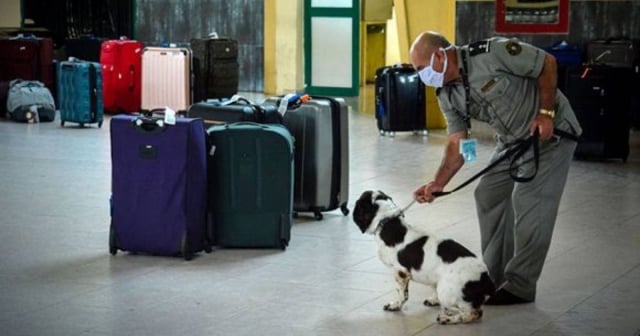A total of 22 people have been arrested in Havana, accused of selling the synthetic drug "in the form of paper," known as "the chemical." According to state media, the seizures of this type of narcotic, very popular on the Island, were carried out "a few weeks ago" in the Zamora-Coco Solo Council, in the Marianao municipality of the Cuban capital.
This police operation, which resulted in around twenty arrests, also reportedly allowed for "obstructing two international drug trafficking operations originating in the United States," says Major Yander Hasty Castillo of the Ministry of the Interior, who attributes this blow to drug trafficking to "information provided by the population," which they corroborated with other information they had.
The provincial prosecutor of Havana, Carla María González Font, has stated in declarations to Canal Caribe that there has been an increase in Cuba in processes related to illicit drugs "or substances with similar effects" recently, and in her opinion, this is due to the "confrontation that the country maintains" regarding these behaviors due to the consequences that drug use has not only for the health of the consumer but also for the social repercussions it causes.
In a trial held recently in Havana, 15-year prison sentences were requested for two foreign citizens for drug-related offenses. Both carried cocaine inside their bodies and were detected at the José Martí international airport. In another hearing, a man was tried after a search at the bus terminal revealed a package of marijuana on his person.
"96% of the people who have been judged in the courts of Havana, whether for trafficking or possession of drugs, have been sanctioned, and of all those sanctioned, 95.8% have been given prison sentences of more than ten and twenty years," emphasizes Yohanier Sierra Infante, president of the Provincial People's Court of Havana.
The state-run press warns that with the Penal Code in hand, the regime "can impose penalties of 30 years of imprisonment, life imprisonment, or even death" in cases of drug trafficking.
"As an additional sanction for these behaviors, when appropriate, the assets related to the criminal activity or derived from it are also confiscated. These can be houses, premises, plots of land, cars, or other vehicles that can be confiscated," insists provincial prosecutor Carla María González Font, clarifying that the legislator considers "certain criminal behaviors, which are related to international drug trafficking, transnational organized crime, and when minors under 18 years are involved, to be more serious."
For his part, Sierra Infante, president of the Provincial Court of Havana, emphasized that with interior drugs it is impossible to preserve "the order of the nation." And since, in his opinion, "all Cubans" understand this, it is "a battle that can be won," but it "requires everyone."
Interestingly, he acknowledges that this problem "is not solved with more prison, nor with more prisoners." However, he makes his stance clear: "If it falls to us, we will continue doing it with rigor." Immediately afterward, he lowered his tone to explain that drug trafficking and drug consumption are controlled with "more support, more work with families, more work in the community, and more work in educational centers." Only in this way, in his opinion, can new generations grow up rejecting drugs, a conviction that previous generations of Cubans have grown up with.
Citizen protest
At the beginning of this month, a citizen protested on social media about the extent of trafficking and consumption of "the chemical" in his neighborhood, Jesús María, in Old Havana, where this drug is "cheaper than a soft drink."
Alberto Turís Betancourt Pérez claimed in a viral video on Facebook that he didn't care if they called him a snitch, but he said he was fed up with seeing young people hooked on "the chemical," ruining their neighborhood, and that's why he raised his voice, risking opposition not only from the regime but also from traffickers and consumers.
In March, a Cuban police operation was revealed, which ended with the arrest of a young man who was allegedly carrying half a pound of "chemical," a substance that some say is based on cannabis and is smoked in cigarettes as if it were simple marijuana. Others have explained to Cubanet that it is prepared with pills for epilepsy, formaldehyde, and anesthesia for animals.
What do you think?
COMMENTFiled under:
